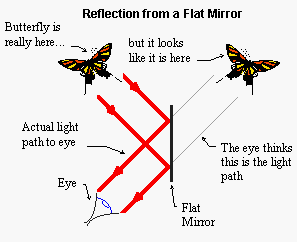Blogger's note: The information I will be posting today aren't mine. They were all taken during our discussion in our Advanced Physics II class with Mr. Mohamad Ali Ramber. The pictures and animations aren't also mine. Credits to the rightful owners who placed it in google.
Where did the queen in the story Snow White say this? To the mirror.
When you want to check if you still look presentable, where do you look? Of course on the mirror or anything that will reflect your image.
Everyday day in our everyday lives, we always use MIRRORS. Although mirrors are not only used solely for seeing your own reflection, facing the mirror to see our own self is one of the most common practical uses of mirror in which almost everyone in this world does.
REFLECTION AND IMAGE FORMATION
There are different kinds of mirror. Some of these examples are the flat or plane mirror, concave mirror and convex mirror.
The Law of Reflection
- The angle of incidence is equal to the angle of reflection: θi = θr
- the incident and reflected lines lie in the same plane with the normal line to the surface
Types of Reflection
1. Regular reflection - reflection on smooth surface
2. Dispersed/Scattered Reflection - reflection on rough surfaces
Characteristics of images formed in mirror:
- laterally reversed
- virtual image (as if the image is found behind the mirror; cannot be projected on screen)
- The same size and distance with the real image
Image Formation






No comments:
Post a Comment